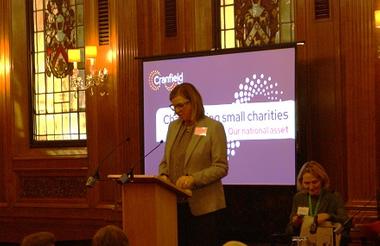Trusts and foundations have been urged to “take more risks” with their money in order to benefit the smaller charities they support.
Speaking at an event organised by the Cranfield Trust on Tuesday, Essex Community Foundation chief executive Caroline Taylor said funders should support “experimentation” from smaller charities so they can “unlock creative solutions to complex challenges”.
She told the audience at Mercers’ Hall in London that funders should “use our influence to advocate for better funding models and highlight the critical role that smaller charities play in society”.
As part of the same panel discussion, recently appointed National Lottery Community Fund chair Julia Cleverdon said more work should be done to increase philanthropy in the UK, particularly at a local level.
‘Relentless cycle of short-term funding’
Taylor said smaller charities have faced a series of challenges including “a relentless cycle of short-term funding which means it is difficult to plan, innovate or collaborate”.
She said her own organisation had reviewed its strategy to include more multi-year core cost grants after finding a “pattern of annual project funding”.
Taylor said funders “need to create spaces for charities to connect and learn”.
“Smaller charities often have brilliant ideas but lack the capacity and sometimes confidence to test them,” she said.
“So, supporting experimentation can unlock creative solutions to complex challenges. I think, as grant funders, we must take more risks with our money and not just simply play it safe.”
‘It’s important to be a champion’
In terms of non-financial support funders should offer to charities, Taylor said leadership development, governance advice and strategic planning “can be transformative, but must be tailored to the realities of smaller charities”.
She said it was also important for funders “to be a champion” of the charities they support.
“We can use our influence to advocate for better funding models and highlight the critical role that smaller charities play in society,” she said.
“Certainly, in the development of our latest strategy, the sector in Essex has asked us to do just this, to use our influence and our voice to advocate for them, to stand by them and to build better understanding about how they work and the value they offer.”
Related articles












